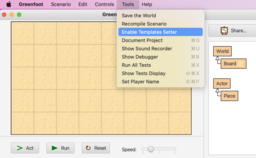last edited Jun 02 2022 by Francisco Guerra
Created by Francisco Guerra. Other contributors:
Short description:
Greenfoot IDE extension to include user template configurationFull description:
To add a new class, the Greenfoot IDE uses templates. These templates, which are applied to define the initial structure of an Actor or a World, help the user at the beginning of the programming of each class that is added to his project. In addition, to reduce the time of preparation of an exercise or to be able to apply it to new students, the teacher can add to the project one or several java classes that the students extend to create their classes with less effort. However, the template that is applied each time a student adds a new class does not always fit well with the class architecture of the project or the learning objectives sought in the exercise. To show the limitation in the application of the templates offered by Greenfoot, an exercise will be designed where control structures are practiced with beginning students.
Test Driven Development with Greenfoot, which can be found in greenroom resources, contains the GreenfootUnitTestIDE-3.7.1.jar executable that adds the creation, editing and execution of unit tests in the Greenfoot IDE to perform the test-driven development in the learning process. Additionally, this latest version includes the user template configuration that the Greenfoot IDE applies to class creation.
This resource introduces the use of user templates with a document and a Greenfoot proyect example. The Greenfoot project shown as an example was created with the modified Greenfoot IDE, that is, after running GreenfootUnitTestIDE-3.7.1.jar.
- View 2 comments on this resource.
- View resource history, links to related resources.
- Leave feedback for the author(s), or help by editing the resource.
Download All
Created by
 Supported by
Supported by
Copyright King's College London, 2017. Contact us.
